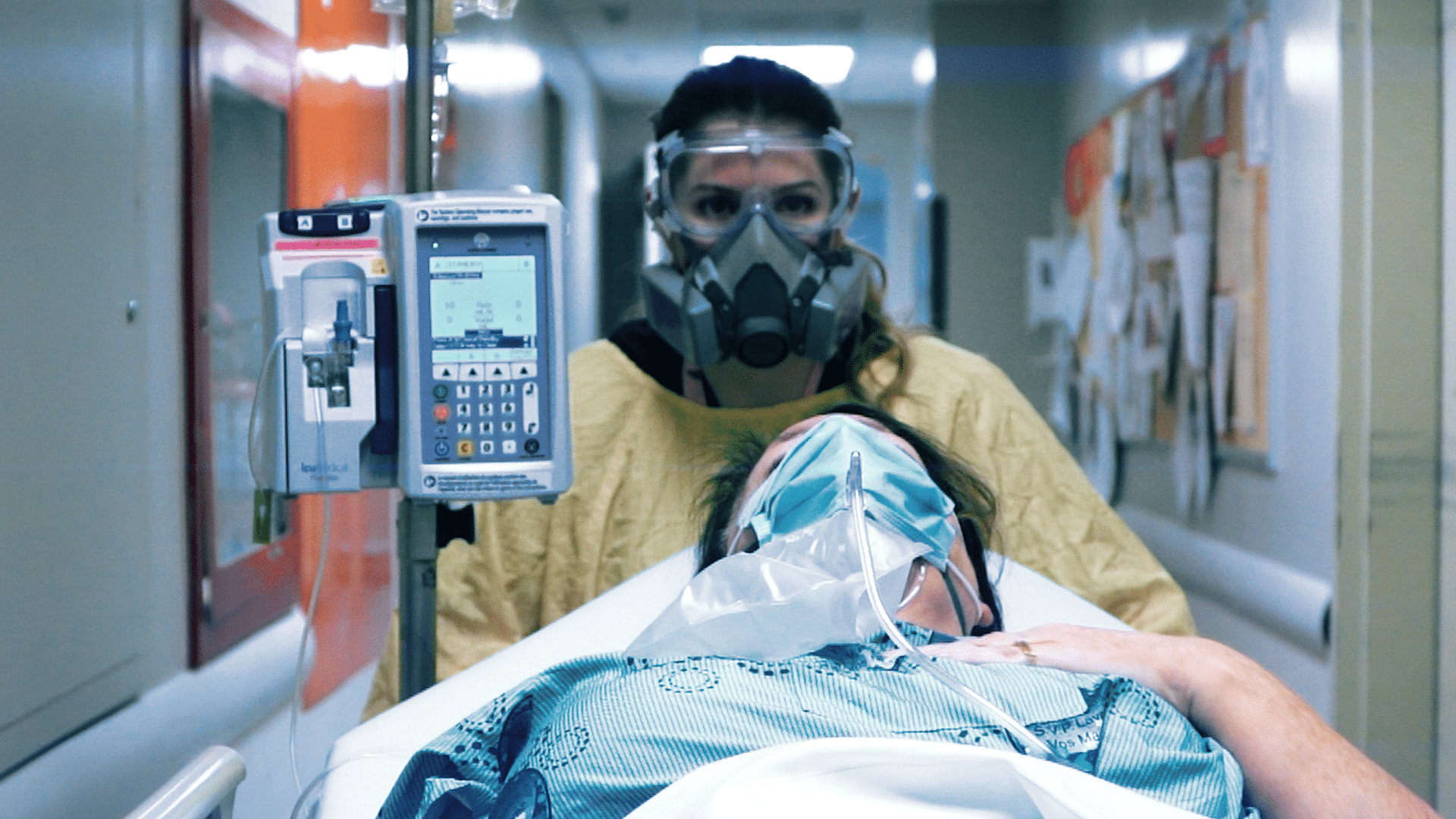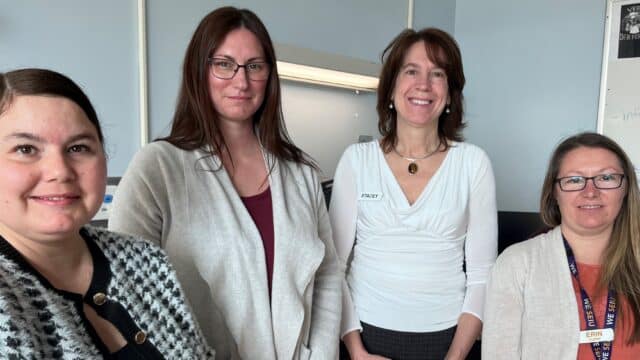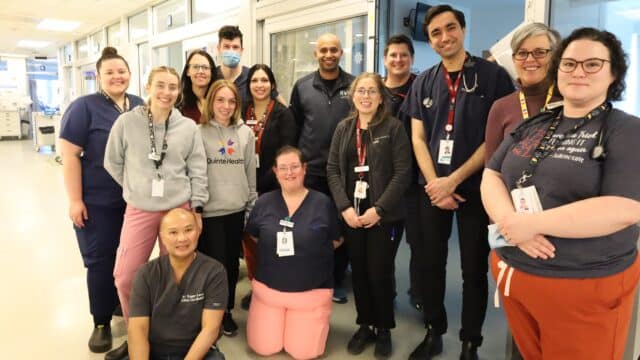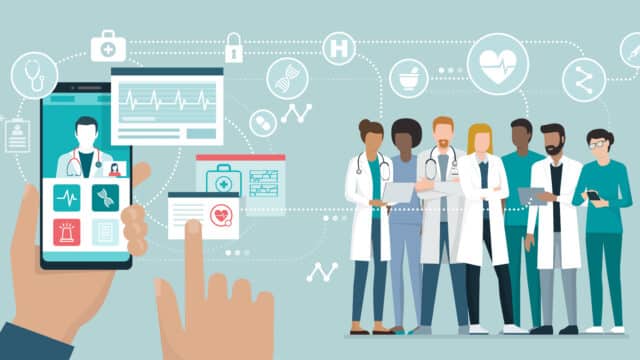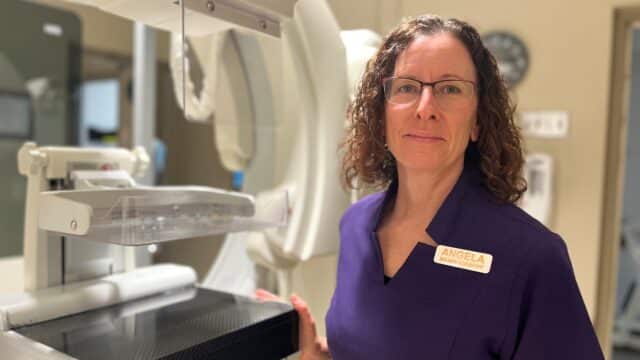A Year of COVID at Quinte Health Care
One year ago, on March 23, 2020, Quinte Health Care (QHC) admitted its first COVID-19 patient.
Our teams had been on standby since early February when Canadian citizens were repatriated from China and began quarantining at CFB Trenton. If any of these citizens needed hospital-level medical care, we would be ready to receive them. At that point, we were still referring to the deadly virus as Novel Coronavirus (the World Health Organization didn’t name it COVID-19 until February 11th), and Canada had, so far, only seen a few cases.
Luckily, as we waited with bated breath, none of the hundreds of repatriated citizens needed QHC care. It wasn’t until a few weeks later, after Canadian cruise ship passengers arrived at CFB Trenton to quarantine, that we received a call about a passenger who was having trouble breathing and had low stats.
“We got off the phone, caught our breath and felt the anxiety,” said Dr. Andrew Samis, an Intensivist in the Intensive Care Unit (ICU). “I thought, ‘so this is it.’”
Dr. Samis and Dr. Michele Miron, a Belleville General Hospital Emergency Department physician, worked as a team to assess and admit the patient.
“In the beginning, there was so much fear and confusion about what treatments to use, but now we have policies and procedures and we have a better understanding about what personal protective equipment (PPE) is required,” said Dr. Samis. “We have come so far as an institution. We haven’t been static – we’re constantly learning, adapting and improving.”
For some, the past year has sped by quickly. For others, the opposite is true. “It has certainly been a difficult year for our communities, our organization, and all our staff,” said Dr. Al Bell, Emergency Department physician. “It’s hard to believe that it has only been a year, to be honest. It seems significantly longer given all the work that we have done to prepare, and to keep preparing as situations evolve and guidelines change. I think this speaks to how labour intensive and emotionally draining the entire process has been.”
The past year has been an incredible journey for Quinte Health Care staff and physicians. We’ve had highs and lows, teaching moments, anxiety about our health and safety, feelings of pride, glimmers of hope, and a whole lot of team-building.
“If you don’t work in a hospital, you don’t realize that we’re not the same people we were a year ago,” said Dr. Samis. “Everyone has had to pitch in – there’s not a single person at QHC who hasn’t contributed.”
To commemorate the one-year anniversary of COVID-19 at Quinte Health Care, we asked staff members and physicians in various roles and departments for their thoughts, feelings and perspectives. Here’s what they had to say:
What are your general reflections of this past year?
“This year has pushed and pulled all of us in directions that we never anticipated. I joked in March 2020 that I must have slept through the pandemic part of medical school, because I certainly did not have an understanding of what would be asked of us. I noticed the resiliency and resourcefulness of the people around me, from federal, provincial and local leaders, to colleagues at QHC and the Prince Edward Family Health Team, to my family, friends and community members. These people, their commitment, and their actions continue to inspire me and give me hope.” – Dr. Sarah Leblanc, Medical Lead, Prince Edward County Memorial Hospital
“It’s been a time of change and growth. At the beginning of the pandemic, the Diagnostic Imaging booking team had to cancel and rebook more than 9,000 patients due to the initial shut down, of which they did an incredible job! Staff had to retrain in different modalities, with staff from other hospital sites coming to Belleville General Hospital to help accommodate staffing needs. I feel that through the ups and downs, we are stronger people and a stronger team.” – Danielle Sangiuliano, Charge Technologist and Clinical Coordinator of Radiology.
“This past year has been all about community. The QHC community at the management level identifying our most pressing needs and addressing them (e.g. sourcing P100 masks to ensure we could safely provide care, and providing regular pandemic communication and Zoom meetings). Community at the unit level (e.g. working together to swiftly and effectively build two sections of our TMH emergency room to provide the best care possible to our patient population). Lastly, the external community support was amazing! Local businesses and community members providing meals, masks, putting up signs in their windows, children dropping off artwork thanking frontline workers. The appreciation shown toward us made coming to work a lot easier.” – Barbara Brooks, Trenton Memorial Hospital Emergency Department RN and Patient Care Lead
“The constant effort to have the best and most current information and practices in place due to the quickly changing information was a challenge but we feel we all came through resilient.” – Amy Rundle, Infection Prevention and Control Practitioner
What are some things we’ve learned in the past year?
“The importance of PPE, inventory monitoring and understanding specifically what is required to avoid transmission. When we had to ration PPE, this was a sobering time for me personally. Our generation has never known what rationing is.” – Ruthann Hubbs, Manager, BGH Quinte 5 (COVID Unit)
“Change is going to happen. Don’t drag your feet, but speak up. Try to help make things better. If you notice someone struggling, plain and simple – help them! We hold each other up. Everyone’s voice is needed. There’s always room for improvement.” – Donna Ray, Hospitality Services Representative
“For my department specifically, we have learned many new techniques and skills with the onboarding of in-house COVID testing. There have been many highs and lows through the past year but we have stuck together as a team to make it through the difficult times. We have learned that Microbiology is an important aspect in the local pandemic response and, as a service that is typically in the background, it is nice to have that acknowledgement.” – Jessica Pilon, Charge Medical Laboratory Technologist – Microbiology and Virology
“I have learned that one of my purposes is to problem solve and to support my colleagues by figuring out the safest, best practices by sifting through the science as it emerges. I have learned that we have to be flexible to be able to shift with the continuing changes in our understanding of COVID. I have also learned to appreciate any downtime I can get and that my home is a sanctuary for me.” – Heather Leonard, Professional Practice Specialist
Through the various challenges we’ve faced, has anything made you particularly proud?
“I have pride in our communities, and how there was widespread adoption of mask adherence, consistent handwashing, and social distancing. I have pride in the leadership and administrative teams that worked hard on both large and seemingly granular issues, and who advocated for and pursued endeavours focused on staff and patient safety. And I have a lot of pride in the physicians, nurses, allied health staff, and support workers in the hospital, all of whom continued to come to work when faced with both uncertainty and adversity, and prioritized the ongoing provision of excellent patient care in the face of what has been the most difficult public health challenge in a generation.” – Dr. Al Bell, Emergency Department Physician
“I am very grateful and proud to work with such an amazing team who exemplified resilience, team work and support of one another, especially during the early trials of the, at times, daily changes that came our way.” – Lisa Mowbray, Prince Edward County Memorial Hospital Site Lead and Patient Services Manager
“Courage under fire. Initially, many of us were uncertain and anxious during the first wave. This “thing” was new and unnerving. I am so proud of the team here on Quinte 5. They are exceptional staff who continued to provide exceptional care during some real challenging times!” – Ruthann Hubbs, Manager, BGH Quinte 5 (COVID Unit)
“Among us are some real unsung heroes like X-ray Techs and Hospitality staff who could be exposed to COVID patients several times throughout their day as they meet new patients or clean multiple rooms. They do their job and show no resistance. It’s really courageous. A lot of doctors and nurses get the attention but we’re not at the highest level of exposure.” – Dr. Andrew Samis, Intensivist and General Surgeon
What does it mean to you now that the vaccine is available for healthcare workers?
“Vaccination brings relief. Vaccination means that while I am still exquisitely careful with personal protective equipment and protocols, the little voice in my head saying, “Danger! Danger!” is a bit quieter, allowing me to focus on patients. Vaccination means that with a mask and good hand hygiene, I can walk into the nursing home where I am co-medical director, and not worry that I am bringing in a lethal virus. Vaccination means that, with precautions, I can spend time with my father who receives wonderful cancer treatment from my colleagues at QHC. Vaccination frees my mind to focus on what is important, being truly present with those around me.” – Dr. Sarah Leblanc, Medical Lead, Prince Edward County Memorial Hospital
“Relief! The team who organized the vaccines at QHC deserve a lot of praise. Well done! Thank you to QHC for acquiring the necessary refrigeration units for the vaccine.” – Barbara Brooks, Trenton Memorial Hospital Emergency Department RN and Patient Care Lead
“I’m hopeful that widespread vaccination will allow us all to return to life as we knew it prior to COVID-19, both in the hospital and also in our outside lives, albeit potentially with an ongoing awareness and focus on the importance of hand washing and masking, depending on vaccine efficacy.” – Dr. Al Bell, Emergency Department Physician
“I am very grateful to know that frontline hospital workers are receiving the vaccine so we can have more confidence that we can look after our patients without increasing the risk of transmitting COVID to them or one another, or bringing it home to our families. We should be celebrating this amazing breakthrough – to have 4 vaccines approved in approximately a year since COVID arrived is a miracle. I hope that with all of the misinformation out there, people will educate themselves with respect to how the different vaccines work and then make their decision to get the vaccine, if not for themselves, then for others around them.” – Heather Leonard, Professional Practice Specialist
